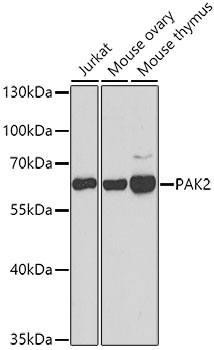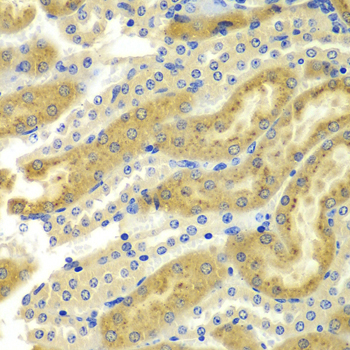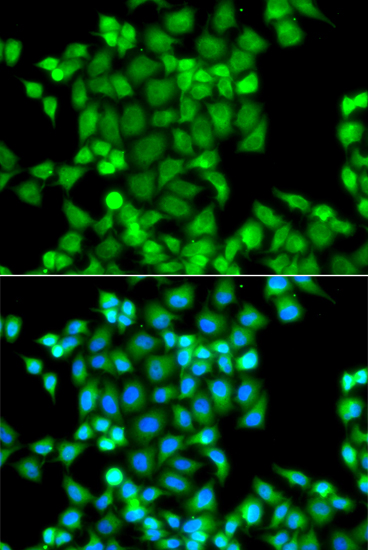Cell Death Antibodies 2
Anti-PAK2 Antibody (CAB7333)
- SKU:
- CAB7333
- Product Type:
- Antibody
- Reactivity:
- Human
- Reactivity:
- Mouse
- Reactivity:
- Rat
- Host Species:
- Rabbit
- Isotype:
- IgG
- Antibody Type:
- Polyclonal Antibody
- Research Area:
- Cell Death
Description
| Antibody Name: | Anti-PAK2 Antibody |
| Antibody SKU: | CAB7333 |
| Antibody Size: | 20uL, 50uL, 100uL |
| Application: | WB IHC IF |
| Reactivity: | Human, Mouse, Rat |
| Host Species: | Rabbit |
| Immunogen: | Recombinant fusion protein containing a sequence corresponding to amino acids 1-212 of human PAK2 (NP_002568.2). |
| Application: | WB IHC IF |
| Recommended Dilution: | WB 1:500 - 1:2000 IHC 1:50 - 1:200 IF 1:50 - 1:200 |
| Reactivity: | Human, Mouse, Rat |
| Positive Samples: | Jurkat, Mouse ovary, Mouse thymus |
| Immunogen: | Recombinant fusion protein containing a sequence corresponding to amino acids 1-212 of human PAK2 (NP_002568.2). |
| Purification Method: | Affinity purification |
| Storage Buffer: | Store at -20'C. Avoid freeze / thaw cycles. Buffer: PBS with 0.02% sodium azide, 50% glycerol, pH7.3. |
| Isotype: | IgG |
| Sequence: | MSDN GELE DKPP APPV RMSS TIFS TGGK DPLS ANHS LKPL PSVP EEKK PRHK IISI FSGT EKGS KKKE KERP EISP PSDF EHTI HVGF DAVT GEFT GMPE QWAR LLQT SNIT KLEQ KKNP QAVL DVLK FYDS NTVK QKYL SFTP PEKD GFPS GTPA LNAK GTEA PAVV TEEE DDDE ETAP PVIA PRPD HTKS IYTR SVID PVPA PVGD SHVD |
| Gene ID: | 5062 |
| Uniprot: | Q13177 |
| Cellular Location: | Cytoplasm, Cytoplasm, Lipid-anchor, Membrane, Nucleus, perinuclear region |
| Calculated MW: | 58kDa |
| Observed MW: | 58kDa |
| Synonyms: | PAK2, PAK65, PAKgamma |
| Background: | The p21 activated kinases (PAK) are critical effectors that link Rho GTPases to cytoskeleton reorganization and nuclear signaling. The PAK proteins are a family of serine/threonine kinases that serve as targets for the small GTP binding proteins, CDC42 and RAC1, and have been implicated in a wide range of biological activities. The protein encoded by this gene is activated by proteolytic cleavage during caspase-mediated apoptosis, and may play a role in regulating the apoptotic events in the dying cell. |
| UniProt Protein Function: | PAK2: a protein kinase of the STE20 family. Critical effector linking RhoGTPases to cytoskeleton reorganization and nuclear signaling. Activated by proteolytic cleavage during caspase-mediated apoptosis, and may play a role in regulating the apoptotic events in the dying cell. |
| UniProt Protein Details: | Protein type:Protein kinase, Ser/Thr (non-receptor); EC 2.7.11.1; Protein kinase, STE; Kinase, protein; STE group; STE20 family; PAKA subfamily Chromosomal Location of Human Ortholog: 3q29 Cellular Component: cytoplasm; cytosol; nucleoplasm; perinuclear region of cytoplasm; plasma membrane Molecular Function:ATP binding; identical protein binding; protein binding; protein kinase activity; protein kinase binding; protein serine/threonine kinase activity; protein tyrosine kinase activator activity; Rac GTPase binding Biological Process: actin cytoskeleton organization and biogenesis; apoptosis; axon guidance; cell migration; cell structure disassembly during apoptosis; innate immune response; negative regulation of apoptosis; negative regulation of protein kinase activity; peptidyl-serine phosphorylation; phosphorylation; positive regulation of peptidyl-tyrosine phosphorylation; programmed cell death; protein amino acid autophosphorylation; protein amino acid phosphorylation; regulation of apoptosis; regulation of defense response to virus by virus; regulation of growth; regulation of MAPKKK cascade; regulation of mitotic cell cycle; Rho protein signal transduction; signal transduction; small GTPase mediated signal transduction; stimulatory C-type lectin receptor signaling pathway; stress-activated protein kinase signaling pathway; T cell costimulation; T cell receptor signaling pathway; vascular endothelial growth factor receptor signaling pathway; viral reproduction |
| NCBI Summary: | The p21 activated kinases (PAK) are critical effectors that link Rho GTPases to cytoskeleton reorganization and nuclear signaling. The PAK proteins are a family of serine/threonine kinases that serve as targets for the small GTP binding proteins, CDC42 and RAC1, and have been implicated in a wide range of biological activities. The protein encoded by this gene is activated by proteolytic cleavage during caspase-mediated apoptosis, and may play a role in regulating the apoptotic events in the dying cell. [provided by RefSeq, Jul 2008] |
| UniProt Code: | Q13177 |
| NCBI GenInfo Identifier: | 143811432 |
| NCBI Gene ID: | 5062 |
| NCBI Accession: | Q13177.3 |
| UniProt Secondary Accession: | Q13177,Q13154, Q6ISC3, |
| UniProt Related Accession: | Q13177 |
| Molecular Weight: | |
| NCBI Full Name: | Serine/threonine-protein kinase PAK 2 |
| NCBI Synonym Full Names: | p21 protein (Cdc42/Rac)-activated kinase 2 |
| NCBI Official Symbol: | PAK2 |
| NCBI Official Synonym Symbols: | PAK65; PAKgamma |
| NCBI Protein Information: | serine/threonine-protein kinase PAK 2 |
| UniProt Protein Name: | Serine/threonine-protein kinase PAK 2 |
| UniProt Synonym Protein Names: | Gamma-PAK; PAK65; S6/H4 kinase; p21-activated kinase 2; PAK-2 |
| Protein Family: | Serine/threonine-protein kinase |
| UniProt Gene Name: | PAK2 |
| UniProt Entry Name: | PAK2_HUMAN |






![Anti-PAK2 Antibody (CAB18093)[KO Validated] Anti-PAK2 Antibody (CAB18093)[KO Validated]](https://cdn11.bigcommerce.com/s-rd6ounxcu2/images/stencil/590x590/products/55233/59976/anti-pak2-antibody-cab18093ko-validated__52083__85231.1706529212.jpg?c=1)


